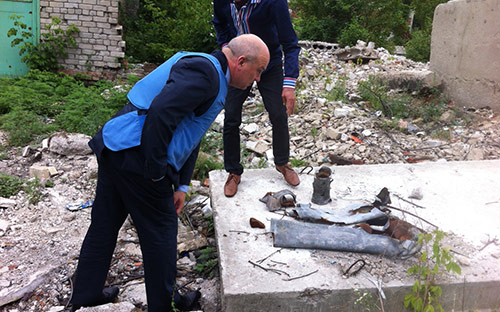“The continuing armed conflict in eastern Ukraine has a devastating impact on the life of communities in the vicinity of the contact line”, stated the Council of Europe Commissioner for Human Rights, Nils Muiznieks, following his visit to Ukraine from 29 June to 3 July. “Facilities such as schools, hospitals and kindergartens are being destroyed, the most vulnerable groups – people with disabilities, old persons, mothers with children – suffer from lack of food, medication, water, sanitation”. As part of this visit, the Commissioner travelled to Donetsk, where his discussions with various interlocutors, including international humanitarian organisations operating on the ground, were focussed on the humanitarian situation in the region. He also visited hospital N 21 in Kuybyshev district of the city of Donetsk, a traumatological centre in the city centre and the residential areas affected by artillery shelling.
The Commissioner also had a substantial discussion with the head of the civil and military administration in Kramatorsk. In Kyiv, he had meetings with various officials, including the Prime Minister. “I encourage both sides to take practical steps in order to facilitate access of humanitarian aid to the affected communities on both sides of the dividing line and in the buffer zone. It is also important to take concrete and pragmatic steps towards minimizing the existing barriers severely affecting freedom of movement across the contact line”. Other issues of importance include the issuing of the birth certificates and passports to the children born and residing in the territories currently outside governmental control, as well as other documents. “While acknowledging security challenges and the lack of effective control over certain territories in the Donetsk and Luhansk regions of Ukraine, it is crucial for the Ukrainian authorities to do their utmost to facilitate access and protect the right to freedom of movement of the citizens and residents of Ukraine living in the conflict-affected areas”.
The Commissioner calls on both sides to strictly respect the provisions of international humanitarian law and to do their utmost to reduce the suffering of the civilians.
During his meetings with officials in the Ministry of Interior and the Prosecutor General’s Office, the Commissioner discussed the on-going reforms in law enforcement. While welcoming the adoption of the amendments to the law on the Prosecutor’s Office as well as on-going efforts to reform the police service, he stressed the importance of promptly addressing the shortcomings identified in the findings of the International Advisory Panel with regard to the investigations of the events on Maidan. He further discussed the state of the investigation into the tragic events of May 2014 in Odessa, as well as the pressing need to ensure accountability for serious human rights violations committed in the east.
In the course of his meeting with the Prime Minister, the Commissioner encouraged the authorities to develop an action plan for the integration of internally displaced persons aimed at providing them with housing options and employment opportunities.
“Ukraine is currently facing enormous challenges. Nevertheless, it should do everything in its power in order to assist the most vulnerable groups of its citizens to live with dignity”. While highlighting the right to safe, dignified and voluntary return of internally displaced persons, he underlined that this would most probably be fully accomplished only after the stabilization of the security situation on the ground. The issue of creating a humanitarian corridor in order to speed up the delivery of humanitarian assistance to the affected population should be also addressed.
The Commissioner expressed his intention to return to Ukraine early next year in order to raise the most pressing human rights issues with the relevant interlocutors in Donetsk and to follow-up on his previous recommendations with the authorities in Kyiv.
A report on the Commissioner’s visit is forthcoming.



